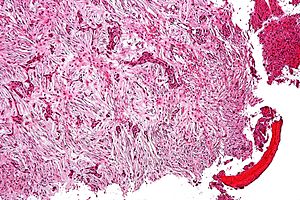Adamantinoma
Jump to navigation
Jump to search
| Adamantinoma | |
|---|---|
| Diagnosis in short | |
 Adamantinoma. H&E stain. | |
|
| |
| LM | biphasic tumour - epithelial component & fibro-osseous component |
| Subtypes | classic, differentiated |
| LM DDx | vascular tumours (epithelioid hemangioendothelioma), metastatic carcinoma |
| Site | bone - classically tibia, other sites |
|
| |
| Prevalence | uncommon |
| Prognosis | benign +/-locally aggressive |
| Clin. DDx | osteosarcoma |
Adamantinoma is an uncommon benign bone tumour.
It should not be confused with adenomatoid tumour.
General
Features:[1]
- Rare: < 1% of bone tumours.
- Typically 25-35 years old.
- Benign, may be locally aggressive.
Gross
- Classically mid portion of tibia.[2]
- Fibula common.
- Reported in many other sites.
Radiology
- Intracortical, radiolucent.
Microscopic
Features:
- Biphasic tumour:[2]
- Fibro-osseous component.
- Spindle cells.
- Epithelial component.
- Classically nests of basaloid cells.
- Fibro-osseous component.
Note:
- It is described as resembling ameloblastoma,[2] but the resemblance isn't striking.
DDx:[3]
- Vascular tumours (epithelioid hemangioendothelioma).
- Metastatic carcinoma.
Subtypes
Subdivided into:[2]
- Classic.
- Differentiated - less than 20 years old only.
Images
www:
IHC
Features:[3]
- CK14 +ve (HMWK).[5]
- CK19 +ve (LMWK).
- CK8/18 -ve (LMWK).
See also
References
- ↑ Humphrey, Peter A; Dehner, Louis P; Pfeifer, John D (2008). The Washington Manual of Surgical Pathology (1st ed.). Lippincott Williams & Wilkins. pp. 650. ISBN 978-0781765275.
- ↑ Jump up to: 2.0 2.1 2.2 2.3 2.4 Jain, D.; Jain, VK.; Vasishta, RK.; Ranjan, P.; Kumar, Y. (2008). "Adamantinoma: a clinicopathological review and update.". Diagn Pathol 3: 8. doi:10.1186/1746-1596-3-8. PMID 18279517.
- ↑ Jump up to: 3.0 3.1 URL: http://www.pathconsultddx.com/pathCon/diagnosis?pii=S1559-8675%2806%2970057-2. Accessed on: 28 April 2011.
- ↑ URL: http://southbaypath.org/CaseImages/sb5260/sb5260.htm. Accessed on: 7 December 2010.
- ↑ URL: http://www.nordiqc.org/Epitopes/Cytokeratins/cytokeratins.htm. Accessed on: 28 April 2011.
